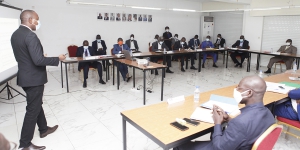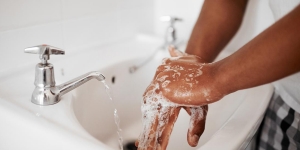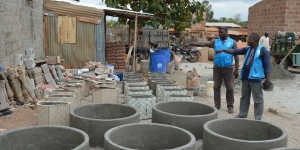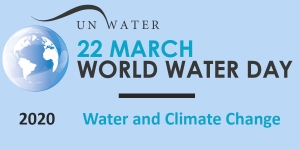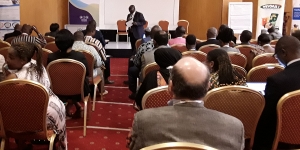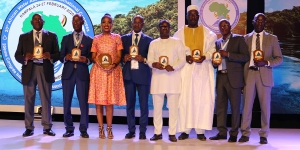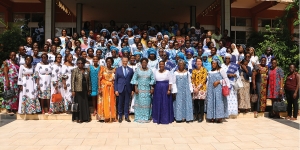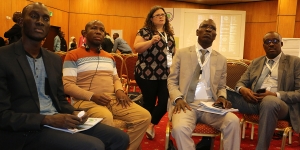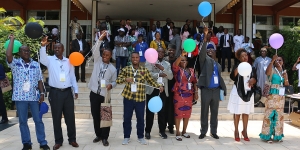Nzickonan Stéphanie
USAID/MuniWASH: Selection of Eight Final Municipalities in Côte d'Ivoire
The West Africa Municipal Water, Sanitation and Hygiene Activity (MuniWASH) is a five-year project funded by the United States Agency for International Development (USAID) and implemented by Tetra Tech in collaboration with the African Water Association (AfWA). The goal of the Activity is to help municipal governments, national directorates and agencies, and service providers maintain and expand water, sanitation, and hygiene services to meet basic needs of populations, including underserved groups, living in urban and peri-urban areas. MuniWASH will select eight municipalities in Côte d'Ivoire and eight municipalities in Benin to benefit from this project.
In May 2020, the first meeting was held at the Direction Générale de la Décentralisation et du Développement Local to introduce the project and convene with representatives of ten pre-qualified municipalities in Côte d’Ivoire. The meeting was attended by the Deputy Managing Director of Decentralization, the Union of Cities and Municipalities of Côte d'Ivoire, mayors and technical directors. These ten pre-qualified municipalities were selected from a total of 200 municipalities in Côte d'Ivoire. MuniWASH led a transparent and participatory municipal selection process that saw the involvement of all key actors in the sector, namely: the Ministry of Territorial Administration and Decentralization, the Ministry of Hydraulics, the Ministry of Sanitation and Hygiene, the National Office for Sanitation and Drainage (ONAD), the National Office for Drinking Water (ONEP), the Water Distribution Company of Côte d'Ivoire (SODECI) and the Union of Cities and Municipalities of Côte d'Ivoire (UVICOCI).
The purpose of this initial meeting was to inform the pre-qualified municipalities of the final qualification stage in the selection process. This phase will be carried out by means of a diagnostic study and evaluation of water and sanitation needs in each pre-qualified municipality. The results of this study will make it possible to make the final selection to retain eight out of the ten municipalities.
As part of the finalization process, the shortlisted towns were asked to provide additional data for this study. Mr. Safaa Fakorede, the Chief of Party of the USAID/MuniWASH project, launched an appeal to the pre-qualified municipalities by stating: "I encourage the pre-qualified municipalities to give themselves every opportunity to be part of the final selection by participating in data collection process and to involve all their available staff to carry out this study."
Representatives of the pre-qualified municipalities expressed great interest in the USAID/MuniWASH project. Access to water and sanitation services is an enormous challenge for the municipalities in Côte d’Ivoire. The USAID/MuniWASH project can provide strategic solutions to help them improve the provision of portable water supply and the availability of sanitation services to the most vulnerable and underserved households.
Dr. TAHET Noel, the Deputy Managing Director at the Direction Générale de la Décentralisation et du Développement Local, a USAID/MuniWASH project implementing partner, congratulated the ten prequalified municipalities and invited them to do everything they could to be selected during the final phase. According to Dr. Tahet, the involvement of the municipalities in the final data collection is the best way to measure commitment and participation of each pre-qualified municipality. The USAID/MuniWASH Project "will make a positive contribution to the lives of citizens," he concluded.
Everything you need to know about washing your hands to protect against coronavirus (COVID-19)
UNICEF Affirms that respiratory viruses like coronavirus disease (COVID-19) spread when mucus or droplets containing the virus get into your body through your eyes, nose or throat. Most often, this happens through your hands. Hands are also one of the most common ways that the virus spreads from one person to the next.
During a global pandemic, one of the cheapest, easiest, and most important ways to prevent the spread of a virus is to wash your hands frequently with soap and water.
Here’s everything you need to know about how to wash your hands the right way:
1. How do I wash my hands properly?
To eliminate all traces of the virus on your hands, a quick scrub and a rinse won’t cut it. Below is a step-by-step process for effective handwashing.
• Step 1: Wet hands with running water
• Step 2: Apply enough soap to cover wet hands
• Step 3: Scrub all surfaces of the hands – including back of hands, between fingers and under nails – for at least 20 seconds.
• Step 4: Rinse thoroughly with running water
• Step 5: Dry hands with a clean cloth or single-use towel
2. How long should I wash my hands for?
You should wash your hands for at least 20-30 seconds. An easy way to time it is by singing the full happy birthday song, twice. The same goes for hand sanitizer: use a sanitizer that contains at least 60% alcohol and rub it into your hands for at least 20 seconds to ensure full coverage.
3. When should I wash my hands?
In the context of COVID-19 prevention, you should make sure to wash your hands at the following times:
• After blowing your nose, coughing or sneezing
• After visiting a public space, including public transportation, markets and places of worship
• After touching surfaces outside of the home, including money
• Before, during and after caring for a sick person
• Before and after eating In general, you should always wash your hands at the following times:
• After using the toilet • Before and after eating
• After handling garbage • After touching animals and pets
• After changing babies’ diapers or helping children use the toilet
• When your hands are visibly dirty
4. How can I help my child wash his or her hands?
You can help children wash their hands by making handwashing easier for them, for instance, by setting up a stool so they can reach water and soap by themselves. You can make it fun for them by singing their favorite songs while you help them rub their hands.
5. Do I need to use warm water to wash my hands?
No, you can use any temperature of water to wash your hands. Cold water and warm water are equally effective at killing germs and viruses – as long as you use soap!
6. Do I need to dry my hands with a towel?
Germs spread more easily from wet skin than from dry skin, so drying your hands completely is an important step. Paper towels or clean cloths are the most effective way to remove germs without spreading them to other surfaces.
7. Which is better: washing your hands or using hand sanitizer?
In general, both handwashing with soap and water and hand sanitizer, when practiced/used correctly, are highly effective at killing most germs and pathogens. Hand sanitizer is often more convenient when you are outside of the home, but can be expensive or difficult to find in emergency contexts. Also, alcohol-based hand sanitizer kills the coronavirus, but it does not kill all kinds of bacteria and viruses. For example, it is relatively ineffective against the norovirus and rotavirus.
8. What if I don’t have soap?
Using chlorinated water or hand sanitizer that contains at least 60 per cent alcohol are the best second options if you do not have soap and running water. In cases where these are not available, using soapy water or ash may help remove bacteria, though not as effectively. If these methods are used, it is important to wash your hands as soon as possible when you do have access to handwashing facilities, and avoid contact with people and surfaces in the meantime.
9. How else can I help stop the spread of the coronavirus?
• Use proper sneezing and coughing etiquette: Cover your mouth and nose with a flexed elbow or tissue when coughing or sneezing, dispose of used tissue immediately, and wash your hands • Avoid touching your face (mouth, nose, eyes)
• Practice social distancing: Avoiding shaking hands, hugging or kissing people, sharing food, utensils, cups and towels
• Avoid close contact with anyone who has cold or flu-like symptoms
• Seek medical care early if you or your child has a fever, cough or difficulty breathing
• Clean surfaces that might have come in touch with the virus, and generally clean surfaces more frequently (especially in public spaces)
Sanitation Service Delivery: micro-entrepreneurs do not envisage the end of SSD project
Funded by the United States Agency for International Development (USAID) since 2014, the Sanitation Service Delivery (SSD) program trains and encourages private sector actors (masons, plumbers, building technicians, etc.) to provide commercial delivery of affordable, quality sanitation products and services to low-income households in Benin and Côte d'Ivoire. Implemented by Population Services International (PSI), the project trained and operationalized 34 micro-entrepreneurs to build sanitation facilities in 19 communes in Benin under the "WC Mimin" label. These include double-pit latrines for alternative use, improved single-pit latrines and defecation pots.To date, at least 19,000 sanitation facilities have been built by micro-entrepreneurs in Benin, compared to more than 8,500 in Côte d'Ivoire under the "Sani Plus" brand.
After an initial phase that lasted from 2014 to 2019, the project obtained a one-year extension from the donor. Before the new closing date of September 2020, the project team is multiplying its actions in order to make the micro-entrepreneurs more and more autonomous. These include encouraging micro-entrepreneurs to recruit their own sales force, approaching households directly, developing partnerships to increase the number of sales outlets and boosting their turnover. The long-term vision is to see these micro-entrepreneurs in sanitation continue the provision of sanitation products and services to households once the project is completed.
In Benin, the micro-entrepreneurs have formed an association for greater efficiency. They created the UNION NATIONALE DES ENTREPRENEURS D'ASSAINISSEMENT MIMIN DU BENIN (UNEAM) with the mission to ensure the supply of "WC Mimin" sanitation products. The first meeting of the members of this association was held during this first quarter. During the meeting, it was a question of defining a set of priority actions to be carried out to make this association more operational. UNEAM therefore wants to carry out advocacy in the cities where the SSD project carries out its activities in order to make itself known to the municipal authorities. The members of this association have also thought about mechanisms to mobilize funding from credit institutions in order to increase their activities. In Benin, according to the 2018 national health survey, only 22% of the urban population uses basic sanitation facilities, while 26% of Beninese use shared toilets and 38% practice open defecation. Universal access to basic sanitation is not yet achieved, largely due to the lack of affordable, high quality and accessible toilets for consumers.
World Water Day 2020
World Water Day, held on 22 March every year since 1993, focuses on the importance of freshwater. World Water Day celebrates water and raises awareness of the 2.2 billion people living without access to safe water. It is about taking action to tackle the global water crisis. A core focus of World Water Day is to support the achievement of Sustainable Development Goal 6: water and sanitation for all by 2030. Water and Climate Change World Water Day 2020 is about water and climate change – and how the two are inextricably linked. The campaign shows how our use of water will help reduce floods, droughts, scarcity and pollution, and will help fight climate change itself. By adapting to the water effects of climate change, we will protect health and save lives. And, by using water more efficiently, we will reduce greenhouse gases. Our key messages for this day are clear: We cannot afford to wait. Climate policy makers must put water at the heart of action plans. Water can help fight climate change. There are sustainable, affordable and scalable water and sanitation solutions. Everyone has a role to play. In our daily lives, there are surprisingly easy steps we can all take to address climate change.
20th AfWA International Congress and Exhibition : AfriAlliance showcased innovations for climate change resilience
20th AfWA International Congress and Exhibition : AfriAlliance showcased innovations for climate change resilience
To achieve SDG 6 amidst climate change, it's crucial to strengthen the capacity of African stakeholders to manage water resources sustainably. In order to contribute to the achievement of this objective; a session on “ Innovation Bridge Event (IBE)” organized by partners of the AfriAlliance project was held to 26 February 2020, at the African Water Association (AfWA) 20th International Congress & Exhibition, under the theme: "Innovations for Climate Challenges in Accelerating Universal Access to Water and Sanitation in Africa’’.
This 5th edition of AfriAlliance bridge events targeted water and climate innovators, academia and researchers, students, policymakers and investors in the water sector in Africa. The session was focused on Innovations for Climate Challenges in Accelerating Universal Access to Water and Sanitation in Africa and offered to stakeholders a great opportunity to showcase, discuss and disseminate research results to a large number of participants, and enable to provide a platform for high-level scientific and policy dialogue on climate change impacts on water. , Also, the session provided the participants with a platform to strengthen cooperation and networking between academia, researchers, policy makers, SMEs, NGOs, public policy actors and local communities.
This session was a stimulating interruptive event where 11 innovators showcased on the solutions they propose to face climate challenge.
Finally, some key recommendations emerged from the discussion:
- Utilities urged to form innovation partnerships ;
- Online knowledge sharing platforms shall be promoted to facilitate spreading/disseminating the latest tools in managing water and climate change risks;
- Utilities and NGOs urged to utilize the Africa Climate Change Fund (ACCF) which is an interesting small financing source for innovators;
- Organizations to consistently collect data which will help fill data gaps and support water management decisions.
Indeed, AfriAlliance is a collaborative action funded by European Union under the Horizon 2020 programme over the period 2016-2021 with the aim to facilitate the collaboration between African and European stakeholders to better prepared African water sector actors in facing climate change challenge.
20th AfWA ICE: Mayors from across Africa reaffirm their commitment to creating and improving inclusive sanitation policies in African cities
20th AfWA ICE: Mayors from across Africa reaffirm their commitment to creating and improving inclusive sanitation policies in African cities
Mayors’ forum on Advancing city-wide Inclusive Sanitation in Africa was held on Tuesday 25 February2020 during the 20th AfWA International Congress and Exhibition. On this occasion, the local elected reaffirmed their commitments related to sanitation made on February 2019 in Cape Town, South Africa at the FSM5/AfricaSan5 conference.
For this 3rd Forum of Mayors in Kampala, 12 African city leaders made commitments to strengthen City to City partnerships for advancing the Water, Sanitation and Hygiene (WASH) agenda at city level. Strategies were agreed to implement the ‘Citywide Inclusive Sanitation’ (CWIS) approach to accelerate ‘access to Sanitation for all by 2030’.
Opened by Erias Lukwago, Lord Mayor of Kampala City, the Mayors’ Forum featured introductory comments from Africa Water Association and the Bill & Melinda Gates Foundation, a keynote address from WaterAid, and presentations from city leaders and sanitation experts.
Participants also shared their practical experiences on progress made following the Cape Town 2019 Mayors’ Declaration last year, alongside panel discussions and brainstorming sessions to strengthen intercity partnerships.
The event was also attended by Political Heads of Local Authorities and cities from across Africa, development partners, Civil Society Organizations (CSOs), CEOs from the utilities and private sectors, as well as High level Government Officials. Participants were required to commit and demonstrate political will to take an innovative approach to leverage financing and adopt technical sanitation.
Discussions focused on the need to develop comprehensive approaches to improve sanitation that encompass long-term planning, technical innovation, institutional reforms and financial mobilization, to benefit the lives and health of local populations.
20th International Congress and and Exhibition: AfWA honors eight of its members
20th International Congress and and Exhibition: AfWA honors eight of its members
As it’s usual during AfWA’s different congresses, members who did render up outstanding services and who by their actions have effectively contributed to the achievement of the Association’s objectives receive medals, thus known and called Honorary Members. For this 20th Congress, AfWA sacrificed the established tradition by awarding the medal of honor to eight of its members. The award ceremony took place on Wednesday, February 26, during the closing gala dinner of the 20th IC & E.
They are:
Mr. DIA Mamadou, former Managing Director of Senegal Water Company (SDE) and AfWA former president,
Mr. DIOULDE DIALLO, Managing Director of the Guinea-Conakry Water Corporation (SEG),
Mr. FOFANA Amara, Chairman of AfWA’s committee within SEG (Guinea),
Mr. BABA-MOUSSA, former Managing Director of BENIN National Water Corporation (SONEB),
Mr. AMADOU Hama MAÏGA, former Managing Director of the International Institute of Water and Environment (2ie) and former 2nd president of AfWA’s Affiliate Members,
Mr. SAWADOGO Moumouni, former General Secretary of the National Water and Sanitation Corporation (ONEA)- BURKINA FASO,
Mr. GOUNDEN Teddy, Strategic Director of e-thekwini Water and Sanitation Unit (South Africa),
Mr. SANGARE Moussa, former Director of Energie Du Mali (EDM – Malian water and electricity corporation) and pioneer of the Association.
It should be noted that the status of Honorary Member is awarded after validation by AfWA Executive Board up on request of the Corporate Member whom the nominated candidate belongs to.
Women want to be involved in the planning and implementation of water and sanitation sector projects
20th AfWA International Congress and Exhibition: Women want to be involved in the planning and implementation of water and sanitation sector projects
Under the theme: "Committed Women Innovating for Access to Water and Sanitation", the Third Forum of Women Professionals in the Water and Sanitation Sector was held on Sunday 23 February 2020 at the Kampala Serena International Conference Center in Kampala, Uganda. This forum represents an opportunity for the hundred or so women from all the member countries of the African Water Association (AfWA) to come together to reflect on this issue, which has a major impact on women.
Several speakers, including the President of the Ugandan National Assembly, Mrs. Rebecca KADAGA who opened the proceedings in the presence of the President of the African Water Association, and Mr. Abderrahim El HAFIDI, pointed out that women must take the full measure of their responsibilities on issues related to water, sanitation, and hygiene.
"This meeting provided a platform for the exchange of experiences that will help increase the effectiveness of women's actions to accelerate access to water and sanitation. So far, women represent the largest direct users of water and sanitation (WASH) services in the domestic consumer market segment of water and sanitation services. However, the very design of these services is technically and commercially conceived and delivered primarily by men, and does not integrate the needs and perspectives of the majority female users, as articulated by them. Thus, for sustainable efficiency, this situation should be balanced to optimize access to water and sanitation services by providing more adequate responses to the needs of female water and sanitation consumers. Furthermore, women must contribute to increase the diversity of the sector's economic fabric through their presence and active role in companies", said Ms. Fatoumata DIAW, Director of Member Services of the AfWA.
A high-level panel moderated by Mrs. Géléga Prudence TANGHAM (Magistrate, responsible at the Ministry of Environment of Cameroon), Dr. Rose Kaggwa (Scientific Director of Water, Hygiene and Sanitation at National Water and Sewage Corporation), Engineer Eleanor Allen (Executive Director of Water for people) and Dr. Fatimatou SALL (Environmentalist), allowed to establish a diagnosis. The observation is that women leaders must take more stock of the role they have to play in order to federate all the efforts for achieving significant increase of access to water and sanitation for all.
At the end of the group work, proposals and suggestions were made to improve and increase access to water and sanitation, including proposals for major innovations in the implementation of policies related to water and sanitation issues. Women took advantage of this forum to call to action political leaders on the importance of protecting women's dignity in water and sanitation issues and, above all, on the relevant need to involve women in the planning and implementation of projects in this sector. Created on 20 February 2016 in Nairobi, Kenya, the network of women professionals in the water and sanitation sector currently enjoys 15 chapters with more than 500 members.
20th AfWA International Congress and Exhibition: AfriCap Implementing Strategy presented at a side event
In order to provide an insight of the African Water Association (AfWA) capacity building program (AfriCap) program and discuss the main challenges and opportunities of the implementing approach with WASH stakeholder include key identified potential partners, a side event to the AfWA International Congress & Exhibition took place at Serena Conference Centre in Kampala, Uganda on 25 February 2019 from 3:00 PM to 4:00 PM under the theme: ‘’AfriCap Implementing Strategy: Challenges and Opportunities’ and with the chairmanship of Mr. KERE Francis, Directeur of the Ouagadougou Region Ouagadougou (DRO) at Office National de l’Eau et de l’Assainissement (ONEA) Burkina Faso.
In the opening remarks, Ms. Margaret MCMORROW, in charge of the Environment and Agreement Officer's Representative (AOR), in the USAID welcomed all the participants at this event, which is organized under the continuation of AfriCap 1 program. Indeed, after a four-year support to AfWA Executive Office on peer-to-peer partnerships on water quality, satisfactory results were noted i.e. capacity-building of ten (10) water quality auditors, benchmarking visit of facilities at ONEA and Laboratoire National de Santé Publique (LNSP) as well, awareness-raising on utilities’ SWOT for strategic watch, improved internal practices as a result of PIPs elaboration/implementation, and the understanding that some improvement-related changes sometimes require just a few amount of funds. Subsequently, USAID is willing to provide new services to AfWA for its members and amongst members for a further four years (2019-2022) in the areas of water quality just like in AfriCap 1, with an added focus on Non-Revenue Water and inclusive sanitation at the city- level.
Consistent with the workshop schedule, Mr. Gilles DJAGOUN gave a Powerpoint presentation illustrating AfriCap 2 program’s objective, component and proposed implementation strategy. Then through a group work session, the participants had the occasion to brainstorm on the challenges and opportunities around partnering with peers for improved performance in the areas of Water Quality (WQ), Non-Revenue Water (NRW) and City-Wide Inclusive Sanitation (CWIS).
At the end, participants expressed their satisfaction about the session which allowed them to better understand the AfriCap 2 program. It also helped to understand expectations and potential targets of some of the program’s beneficiary countries in the areas of WQ, NRW and sanitation for a given timeframe, cross- sectoral difficulties were highlighted, thus revealing that several countries experience the same difficulties with financing, equipment, policies etc. in activity implementation.
20th International Congress and Exhibition: AfWA officially launches the SAO-CWIS programme
During its 20th International Congress and Exhibition, held from 24 to 27 February 2020, AfWA organised on Wednesday 26 February a parallel session for the official launch of its new programme of ‘’Strengthening AfWA and Operators’ capacity for the Implementation of City-wide Inclusive Sanitation in Africa’’ (SAO-CWIS).
Building on the RASOP Africa project, and funded by the Bill and Melinda Gates Foundation for the period 2019 to 2022, this programme aims at building primarily the capacity of sanitations operators (Municipalities/utilities) for them to efficiently provide a safe sanitation to all in 30 African cities of 10 African countries scattered in sub-Saharan countries.
During the session participants were informed on the key activities and the outcomes the project aims to achieve, the partners involved and the approach of implementation. Indeed, beneficiaries’ cities/mentees as well as potential mentors were presented.
The presentation was followed by a round table discussion on equity and inclusion in sanitation and provided ideas on how to achieve it at the city level.
At the end of the session, balloons were launched as a sign of the effective start of the project.

 English
English  Français
Français 
